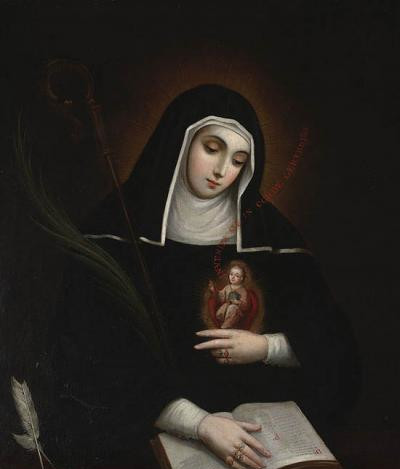
Saint of the Day for 16 November: St. Albert the Great
St. Gertrude the Great: the German mystic who talked to God
Name
St. Gertrude the Great
Title
Virgin
Birth
January 06, 1256, Eisleben, Germany
Death
17 November 1302, Kloster Helfta, Eisleben, Germania
Recurrence
16 November
Martyrology
2004 edition
Canonization
1667, unknown
Prayer
O God, who through prayer and the glorious lives of your saints, and especially of St. Gertrude, called our fathers to the wondrous light of the Gospel, grant that we too may live in the commitment to a new evangelization of this third Christian millennium and, overcoming the snares of the evil one, grow in the grace and knowledge of our Lord Jesus Christ, who lives and reigns for ever and ever. Amen.
Patron saint of
Rotzo
Roman Martyrology
St. Gertrude, Virgin, whose natal day is remembered on the following day.
The Saint and Mission
St. Gertrude the Great, a 13th-century mystic and theologian, offers a singular and deeply influential perspective on Christian mission. Born in Germany and entering the convent at the age of five, Gertrude became known for her mystical experiences and spiritual writings that left a lasting impression on the Church. St. Gertrude’s mission was distinguished by her intense inner focus and deep relationship with the divine. Her mystical visions and spiritual understanding provided a source of consolation and guidance for many of the faithful, making her work an important bridge between the earthly and spiritual worlds. Her ability to communicate these experiences through her writings opened a window into the nature of divine love and the possibility of intimate communion with God. In Gertrude, mission was not expressed in terms of conversions or geographical expansion, but rather in the depth of her prayer life and her ability to transcend the barriers between the human and the divine. Her devotion was an example of how the contemplative life can have a missionary impact, enlightening and nurturing the faith of those seeking a deeper relationship with God. Gertrude was also known for her love for the Sacred Heart of Jesus, an aspect of her teaching that had a profound impact on Christian spirituality. Her emphasis on Christ’s love and mercy helped form a vision of divinity that is intimately linked to compassion and acceptance, offering a model of how divine love can be experienced and lived out in daily life. Her work shows that mission can be lived through seeking a deeper understanding of the mystery of God and in sharing that understanding with others. In this sense, St. Gertrude the Great teaches us that every Christian is called to a mission, not necessarily through external actions or mass conversions, but also through an inner journey of discovery and love, which in turn can radiate light and truth into the world. The life and work of St. Gertrude the Great represent a mission lived through mysticism and theology, a powerful testimony to how the inner life can become fertile ground for deep missionary engagement.
The Saint and Mercy
St. Gertrude the Great, one of Christianity’s most eminent mystics, sublimely embodies the essence of divine mercy. Her life, spent within the walls of a Benedictine monastery in the 13th century, was a continuous immersion in the depths of God’s love and mercy, experiences that transcended words and manifested themselves in mystical visions and deep spiritual insight. The heart of St. Gertrude’s spirituality was her relationship with the Sacred Heart of Jesus, the symbol par excellence of divine love and mercy. Her revelations and meditations on this theme profoundly influenced Christian devotion, opening new ways for the faithful to understand and experience God’s merciful love. Gertrude saw in the Heart of Christ the ultimate source of all consolation, healing and hope, and she devoted her life to making this reality known to those close to her. Mercy, for St. Gertrude, was much more than a feeling or an action; it was a lived reality, a way of being in relationship with God and with others. Through her prayers and works, she showed how mercy can transform the human heart, guiding it toward greater union with God and more sincere compassion for one’s neighbor. Her life was a continuous act of offering to God, a channel through which divine mercy could flow into the world. Moreover, her influence did not remain confined within the walls of her convent. Through her writings, Gertrude offered an enduring witness to God’s merciful love, influencing countless generations of believers. Her works continue to be a source of inspiration and comfort to those seeking a deeper connection with the heart of God. The life of St. Gertrude the Great is a powerful reminder that mercy is at the heart of the Christian journey. She teaches us that every heart can become a reflection of God’s love, and that through prayer and meditation we can open ourselves and the whole world to the transformation that such love can work. His legacy is an invitation to enter more deeply into the mystery of divine mercy, discovering in it the source of true joy and purpose.
Hagiography
S. Gertrude was born in Eisleben, Saxony, to a distinguished family. At the age of five she was placed in the monastery of Helfta, belonging to the Cistercian order. This monastery, founded by Count Burchard of Mansfeld in 1229, was then headed by Abbess Gertrude of Hackeborn, who governed it for the space of about forty years. Strange confusions, caused by the similarity of name and…
